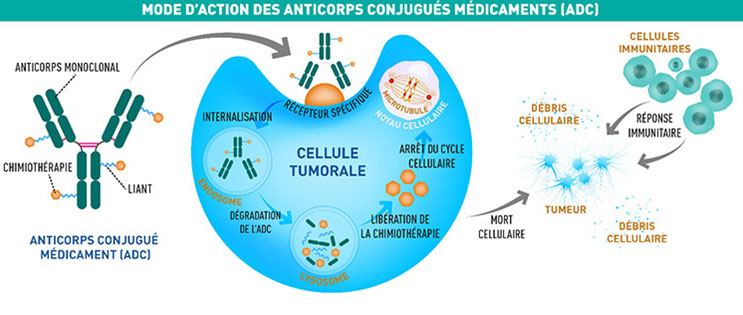Paris, 27 March 2024
Research agreement between Gustave Roussy and Amgen to predict the effectiveness of antibodies drug conjugates
Bringing together the effectiveness of chemotherapies and the specificity of antibodies is the challenge taken up in recent years with conjugated antibodies (antibody-drug conjugates/ADCs) which are beginning to be part of patient care, by transforming major impact on their life expectancy and quality of life. However, some patients will not respond to these treatments. In order to understand why and be able to predict the effectiveness and risk of development of resistance in a patient, Amgen has just signed a one million euros research agreement with Gustave Roussy in order to precisely study the interactions of ADC with the tumor cell. Objectives: identify biomarkers to better target patients on whom these treatments will be effective, and refine the optimal doses of use.
In recent years, antibody conjugates (antibody-drug conjugates/ADCs), which couple chemotherapy molecules to an antibody, have opened a new era in anticancer treatments with impressive results for certain cancers. Unfortunately, not all patients are sensitive to these treatments. What are the elements that intervene in the effectiveness of the destruction of the tumor cell once the antibody is fixed on the surface of the cell? A research question that allows us to understand why these therapies, which are so effective on some patients, are not so effective on others. Strongly committed to this new area of research and development that ADCs represent, Amgen has decided to answer this question by joining forces with Gustave Roussy researchers.
“Amgen was a pioneer in the research and development of monoclonal antibodies and is now investing in the development of ADCs. In order to better understand the elements that come into play in the effectiveness of these therapies, we are happy to begin this ambitious research project in France with Gustave Roussy” declares Nathalie Varoqueaux, Medical Director of Amgen France .
With a budget of one million euros over two years, the research will explore on the one hand the 3 stages which follow the attachment of the ADC to the tumor cell: endocytosis (entry into the cell within of a vesicle), the endosomes involved in the transport of ADCs to the lysosome, and finally the elements of the lysosome involved in the cleavage of ADCs, separating the antibody from the chemotherapy. On the other hand, non-tumor specific factors – endocytosis by stromal cells or healthy tissues – will also be studied because they can channel the antibody, thus attenuating its action on cancer cells.

“To carry out these investigations and identify the determinants and compounds that can counter the effectiveness of these innovative treatments, our researchers will work on organoids created from 3D culture of patient cells, which will allow us to be faster and more precise. This is an exciting project for our teams” says Professor Fabrice André, director of research at Gustave Roussy
The characterization of the elements involved in the internalization of ADCs within the tumor cell should make it possible to identify biomarkers, which can be used to predict the effectiveness of the treatment in patients and if not, to be able to offer another treatment without loss of luck. The results of this research should also make it possible to refine the optimal doses and the sequences to be implemented for maximum effectiveness.
Gustave Roussy, member of the Amgen Partners of Choice network
In October 2023, Amgen, through the creation of Amgen Partners of Choice (APoC), joined forces in France with Gustave Roussy, alongside experts in oncology research and development and clinical leaders from seven other world cancer research centers. This network aims to create multiple channels of collaboration on a global scale with the aim of accelerating the transition of disruptive innovation programs to leaders in the clinic. Current APoC projects focus on certain disease areas and tumor types, including thoracic, gastrointestinal and genitourinary cancers. “Our participation in international medical-scientific networks of the highest level, and in particular that of APoC with Gustave Roussy as the only site in France, allows us to develop large-scale research collaborations for the benefit of patients living with cancer. This partnership is an excellent illustration of this” declares Professor Fabrice Barlesi, Managing Director of Gustave Roussy.
